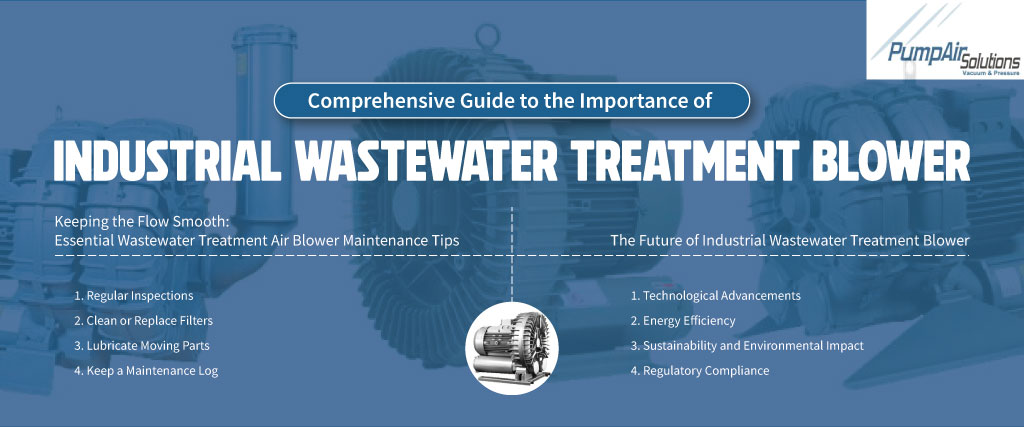Industrial Wastewater Treatment Blower is essential to preserving the efficiency of these wastewater treatment processes. The aeration process depends on these blowers as they add air to wastewater to promote the growth of aerobic bacteria that degrade organic contaminants. Without proper aeration, the biological treatment processes would slow down, resulting in inefficiencies and possible compliance problems.
You can also read: Blower For Wastewater Treatment Enhancing the Quality of Water
The primary task of an industrial wastewater treatment blower is to ensure constant oxygen availability, essential for organic matter’s aerobic decomposition. This oxygenation process reduces the two important markers of water quality, i.e., chemical oxygen demand (COD) and biochemical oxygen demand (BOD). An effective decrease of BOD and COD ensures that treated water fulfills ecological standards and is safe for disposal or reuse.
Another important feature of an industrial wastewater treatment blower is its energy efficiency. Modern blowers are designed to work well using minimal energy. This efficiency reduces operating expenses and the environmental impact of wastewater treatment facilities. Moreover, advanced blowers equipped with variable frequency drives (VFDs) offer more control over airflow, increasing operating flexibility and energy savings.
Maintaining blowers properly is essential to their long-term functionality. Industries can avoid malfunctions and increase the equipment’s lifespan with regular cleaning, inspection, and early replacement of worn-out parts. A strict maintenance schedule and an investment in a high-quality industrial wastewater treatment blower can result in long-term savings and reliable performance.
Keeping the Flow Smooth: Essential Wastewater Treatment Air Blower Maintenance Tips
Ensuring smooth facility operations and compliance with ecological standards requires maintaining the efficient operation of air blowers. Regular maintenance for these air blowers improves their performance, minimizes the possibility of expensive malfunctions, ensures regular service procedures, and extends their lifespan. The following are some vital maintenance guidelines to ensure the proper operation of your Wastewater Treatment Air blower.
- Regular Inspections
Regular inspections are essential to identify any possible problems before they become serious ones. Inquire about any strange noises, vibrations, or temperature variations as they can indicate underlying problems. Check regularly to ensure belts, filters, and seals are in good working order.
- Clean or Replace Filters
Dust and other particles are kept out of the air blower system using air filters. These filters can clog with time and decrease efficiency and airflow. Therefore, maintaining ideal airflow and avoiding blower damage requires regular cleaning or replacement of air filters.
- Lubricate Moving Parts
Proper lubrication of moving parts like bearings and gearsed reduces friction, wear, and overheating. Follow the manufacturer’s recommendations for lubrication intervals and use the suggested lubricants to maintain the longevity and effectiveness of your Wastewater Treatment Air Blower.
- Monitor Pressure and Temperature
Monitor the pressure and temperature of the Wastewater Treatment Air Blower system regularly. Unusual readings can occur due to leaks, blockages, or mechanical breakdowns. Maintaining these parameters within the suggested range promotes effective operation and avoids any damage.
- Keep a Maintenance Log
Keep a comprehensive record of every maintenance task, such as cleanings, repairs, inspections, and part replacements. This log makes it easier to monitor operations, detect repeated problems, and schedule upcoming maintenance tasks of the Wastewater Treatment Air Blower.
The Future of Industrial Wastewater Treatment Blower
Technological, energy-efficient, and environmentally sustainable developments will change the future of industrial wastewater treatment blower. Revolutionary blowers are becoming essential to achieve these goals as the industry focuses on economical and environmentally sustainable solutions.
- Technological Advancements
- Integrating artificial intelligence (AI) and the Internet of Things (IoT) into blower systems is one of the biggest developments in the future.
- These technologies allow blower operations to be monitored and optimized in real time, improving efficiency and lowering energy costs.
- Artificial intelligence-enabled smart wastewater treatment blower can predict maintenance needs, avoiding expensive malfunctions and ensuring lasting functioning.
- Moreover, IoT connectivity allows data analysis and remote management, offering insights for efficiency gains.
- Energy Efficiency
- Future wastewater treatment blower is expected to reach unprecedented levels of energy efficiency.
- Variable frequency drives (VFDs) and advanced control algorithms allow blowers to modify their output accurately to satisfy the needs of the wastewater treatment process.
- This accuracy reduces operating expenses and wasteful energy use.
- Furthermore, using sustainable energy sources like wind or solar power can help wastewater treatment facilities minimize their carbon footprint.
- Sustainability and Environmental Impact
- Blower design will prioritize sustainability in the future.
- Developments in the field of materials science will result in more robust and effective parts, extending the blower life and decreasing replacement needs.
- Moreover, manufacturers are developing blowers with less emissions and operate at lower noise levels, helping to create a quieter and cleaner atmosphere.
- Regulatory Compliance
- Advanced wastewater treatment blower will ensure compliance with increasingly demanding environmental standards.
- These future blowers will be made to the strictest guidelines, protecting natural water bodies from pollution and helping facilities avoid fines and legal troubles.
Final Thoughts -
Modern air blower systems offer improved sustainability, reliability, and efficiency for treating wastewater. These blowers optimize energy use and offer real-time monitoring using technologies like variable frequency drives (VFDs) and the Internet of Things, ensuring constant performance and reduced operating costs. Therefore, investing in these innovative solutions helps achieve sustainability, environmental compliance goals, and the increased efficiency of wastewater treatment operations. Moreover, adopting these ideas allows wastewater treatment facilities to revitalize their operations, increase productivity, and help create a cleaner environment.
If you are looking for a comprehensive platform for all types of efficient, reliable, and affordable Wastewater Treatment Air Blower, then Side Channel Blowers is the right place. Here you can find the perfect blower for your industrial needs. Visit our website at Side Channel blowers to learn more about the blower types and the pricing we offer.

